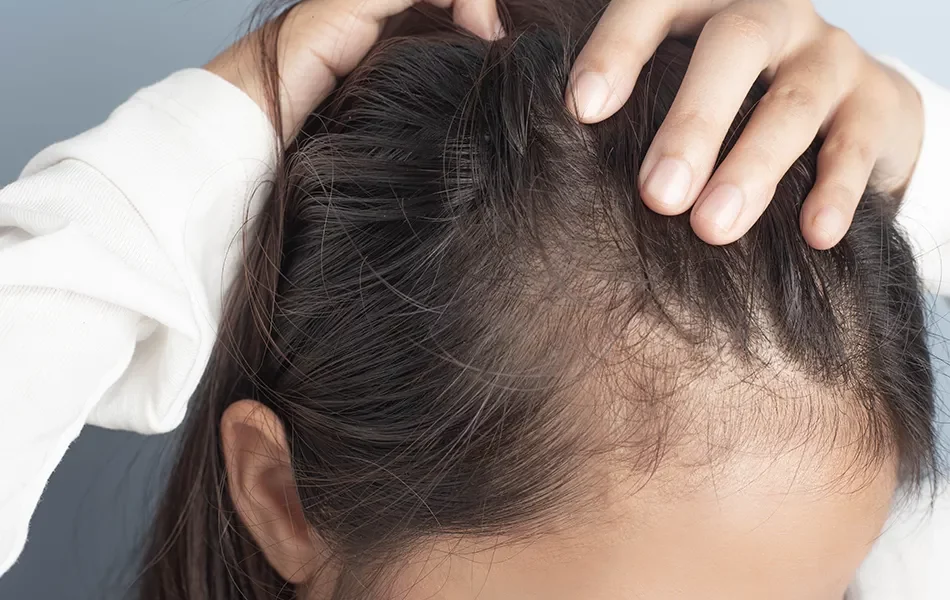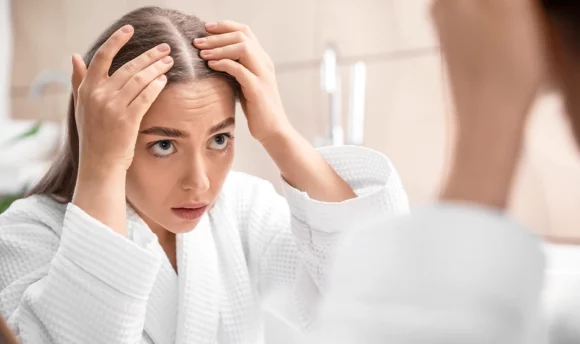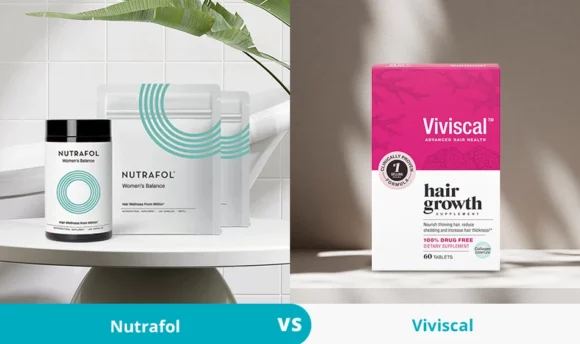Can Shampoo Cause Hair Loss? Ingredients to Watch Out For
What’s the link between shampoo and hair loss?

Your hair grabs onto dirt, excess product, and pollutants throughout the week. Sebum oil also builds up on the scalp, which makes your roots appear greasy. This is when shampoo comes to save the day, as it can cleanse each hair strand and make your locks feel smooth and healthy again.
But choosing the right shampoo is very important. There are many branded products that throw in unnecessary or harmful ingredients. Thus, you need to think twice before buying shampoo from your local store.
Before buying shampoo, many people wonder whether it causes hair loss. Discover whether this is true, along with ingredients you should avoid to maintain healthy hair strands.
Can Shampoo Cause Hair Loss? Probably No, Here’s Why
There isn’t enough evidence to suggest that shampoo causes hair loss. Certain ingredients can lead to poor scalp health, but that depends on how much you use. You can lower the risk of potential hair loss by choosing high-quality hair products.
People may believe that the wrong shampoo encourages excessive hair fall. However, this is rarely the case, as hair loss usually stems from hormone changes, aging, medication, or inherited conditions.
But cleaning your hair with too many toxic ingredients can lead to poor scalp health, which contributes to premature hair loss. For example, dry shampoo may clog each hair follicle and trigger inflammation. It’s important to remember that products don’t directly cause hair loss, as they only affect your scalp.
You can talk to a trichologist about what products to use. These professionals will suggest shampoo for your hair type and certain oils, such as avocado and rosemary, to promote natural hair growth.
What Makes Your Hair Fall Out in the Shower?
Stimulating your scalp can cause hair to fall out, but that’s not a bad thing. Your hairs need a little nudge to leave the hair follicles as they are ready to transition out of the final phase of hair growth.
You may panic after seeing your hair strands go down the drain. Shampooing your scalp gets rid of dead hair, so what you experience is not direct hair loss. Hair also falls when you brush or style it throughout the day.
A study found that your hair goes through the anagen, catagen, and telogen phases. These stages represent the growth of new hair, detachment from each hair follicle, and natural hair fall once the hair is dead. You may find clumps of hair in the shower when they’ve left the telogen cycle. However, hair loss can also stem from stress, age, hormones, tight hairstyles, and medical conditions.
9 Shampoo Ingredients You Should Avoid
There are some ingredients that can damage your scalp and cause hair thinning. You should always look at the product’s label to ensure it is safe for long-term hair health.
Below are some shampoo ingredients you should avoid:
#1 Sulfates
Sulfates are chemicals that have a foaming effect in shampoo. This ingredient creates a frothy lather to help remove dirt, product buildup, and excess oil. However, it sucks too much moisture from each hair strand. You may find that after using shampoo containing sulfates, your hair is more dry and brittle than usual.
Research suggests that sulfate irritates and damages hair follicles. Poor scalp health restricts hair growth, meaning a slower growth rate in the anagen phase. Even though sulfates help clean your locks, they make them dry and weak, which can encourage hair ends to snap off.
#2 Formaldehyde
Formaldehyde is a strong chemical present in many hair-cleansing products. Too much of it can increase the risk of scalp irritation and deplete the natural oils on your roots. Hair smoothing shampoos and sprays release formaldehyde gas, which isn’t safe for your eyes, scalp, lungs, and skin.
#3 Sodium chloride
Sodium chloride is an ionic compound and type of salt. Constant exposure to this compound may dehydrate your hair, which encourages hair fall due to weakened split ends. Not treating dry hair causes it to become brittle and fragile.
Your scalp could also get dehydrated from sodium chloride in shampoo. Dandruff forms when dry skin peels off of the scalp. Over time, dandruff damages your hair follicles and makes it longer for hair to grow back.
#4 Alcohol
Not many people realize that alcohol contributes to the ingredients list in some shampoo. It is a common ingredient that acts as a drying agent. Dehydrated hair leads to scalp dryness and hair breakage, so it’s important to buy hair products that don’t contain forms of isopropyl alcohol.
#5 Parabens
Parabens are artificial chemicals that prolong shampoos and other cosmetics. They are known to fade color, cause an itchy scalp, and dry your hair out. It’s believed that your skin easily absorbs parabens, which isn’t good for long-term scalp health. A damaged scalp can contribute to hair loss if you don’t use the right products.
#6 Propylene glycol
Propylene glycol is a colorless liquid that shares the same chemicals as alcohol. It removes your hair’s natural oils, which removes a moisture boost throughout the week. Not having enough moisture in your hair can cause scalp irritation and even hair shedding when your hair follicles weaken.
#7 Silicones
Silicones are another group of chemicals that cause damage to your hair in the long term. This ingredient builds up on your roots, hair edges, and ends, which makes hair prone to extra dryness and breakage. You may notice your hair becoming dull and dry over the next few months of using the shampoo.
You should also be aware of unrefined and low-grade silicones. Check the ingredients list to ensure the shampoo contains minimal synthetic compounds.
#8 Phthalates
Phthalates are chemical compounds that mess with your hair growth hormones. A study found that these chemicals disrupt the hair cycle, which may slow down growth and cause scalp inflammation. If your follicles cannot produce and grow hair properly, it may cause certain hair strands to fall out completely.
#9 Synthetic fragrances
You might use the same shampoo because it smells good, but those smells can derive from bad ingredients. There are many synthetic fragrances that encourage hair loss, and they are often made with petroleum – a chemical. These fragrances increase the risk of rashes on your scalp. Using shampoo containing synthetic ingredients may cause dandruff and further hair loss.
How to Prevent Hair Loss Caused by Shampoo
There are many ways you can prevent hair loss and maintain a healthy scalp. You should take the time to build a sustainable hair routine that involves natural shampoos, conditioners, and hair masks.
Here are ways you can prevent hair loss caused by harmful shampoo ingredients:
#1 Opt for natural haircare products
Choose a shampoo that contains natural ingredients only. There are herbs, such as palmetto, horsetail, and vitamin B3, that help prevent hair loss. Research suggests that vitamin B3 can also stimulate human dermal papilla cells, which encourage hair growth due to the stronger follicles.
Certain oils may treat hair loss by nourishing your scalp. For example, argan oil can moisturize and strengthen your hair shaft to support new hair growth and sulfur enhances hair growth and might reduce dandruff. You can have shiny and smooth hair without having to deal with the dehydration effects of harmful shampoo.
#2 Shampoo hair according to your hair type
Everyone has different hair that requires a tailored routine. People with dry locks may use a shampoo containing shea butter, while someone with dandruff needs tea tree oil. You should focus on how you can treat your hair type with natural shampoo, conditioner, and even hair masks throughout the week.
#3 Create a holistic haircare routine
Instead of focusing on shampoo, think about other haircare products like conditioners, heat protectants, hair masks, and scalp oil. You should also focus on eating whole foods that feed your body essential nutrients, such as iron, protein, and vitamin D.
Creating a sustainable routine ensures you’re tending to the needs of your hair without using harmful ingredients.
You can also learn to dry your hair properly using a microfiber towel. This material prevents friction from breaking hair ends.
FAQs
No, washing your hair every day doesn’t make your hair fall out, but it isn’t recommended. You should leave enough time between each hair wash to prevent excess sebum oil. Most hair experts suggest washing your hair 1–2 times a week.
Too much shampoo won’t damage your hair. However, it can be a waste, so only use a handful of shampoo to gain the same cleaning effects. For those with longer hair, 2–3 pumps of shampoo are enough.
There is no harm in changing your shampoo since it doesn’t cause hair loss. You may need to change shampoos to clean your hair with better ingredients. Just make sure to choose one that contains nourishing vitamins and minerals, such as vitamin B3 and iron.
A Word From a Trichologist
Dealing with hair loss can be frustrating and upsetting. You may believe shampoo is to blame, but there are many other factors that contribute to hair falling. Genetics play a huge role and how fast your hair grows and drops out.
Following healthy habits can also make your hair grow faster. For example, drinking more water can hydrate your hair, and limiting how much you wash your hair a week may preserve natural sebum oils.
Some people perform a daily scalp massage to stimulate growth and increase blood circulation to hair follicles. Over time, the scalp has enough nutrients and blood to prevent hair loss and extend the growing phase.
Before buying shampoo, check the ingredients label. You want to avoid products that contain chemicals and synthetic fragrances.
Conclusion
Shampoo won’t directly cause hair loss, but it can slow down the hair growth rate and damage your scalp. You should avoid buying products containing harsh chemicals and artificial fragrances. Instead, find a shampoo that is completely natural, as it can help you nourish and clean your hair properly.

















































 Select your language:
Select your language: 








